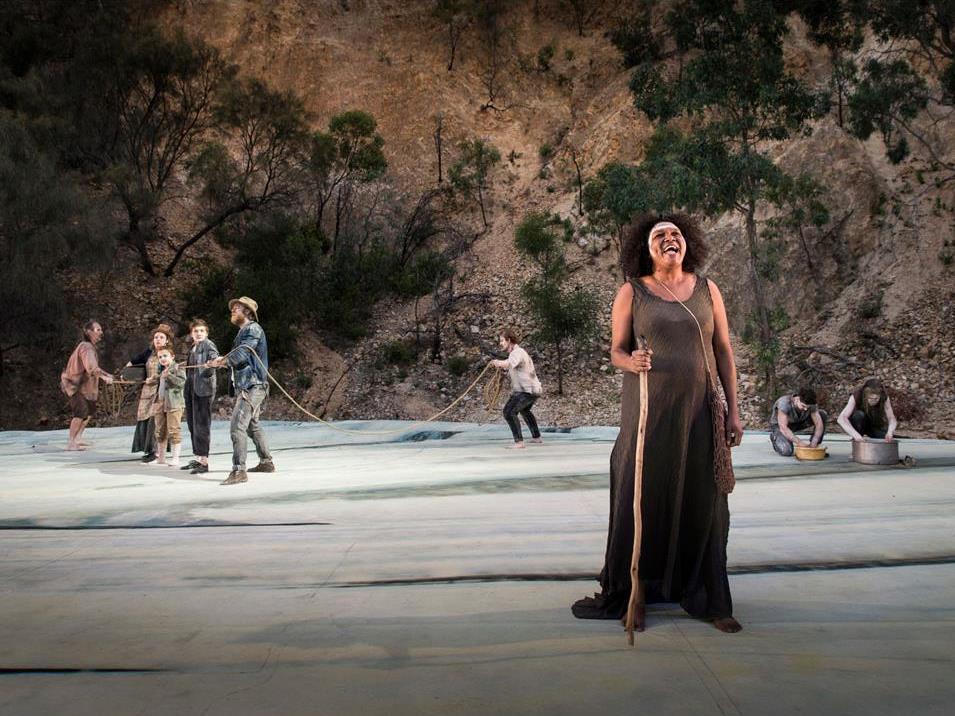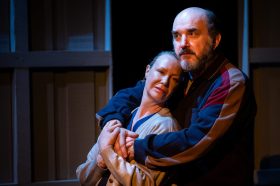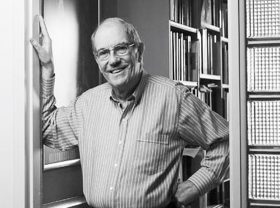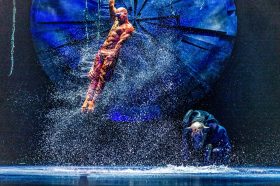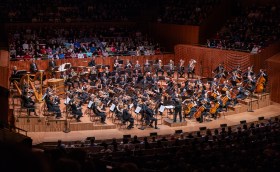Image: A scene from Bovell’s The Secret River at the 2017 Adelaide Festival, Ningali Lawford Wolf in foreground. Photo credit: Shane Reid.
Andrew Bovell is one of Australia’s most respected playwrights. In this extract from the latest Platform Paper, IN THEIR MOUTHS: The playwright and screenwriter at work (published by Currency House) Bovell reflects on the mutually dependent nature of theatre makers, the flaws in existing commissioning models, and the importance of contemporary Australian writing and the Australian canon in our theatre culture.
*****
I began this paper by making a distinction between the work of the playwright and the work of other writers, such as novelists and poets. I wanted to draw attention to the collaborative nature of the playwright’s role. Unlike other writers who work in isolation, we belong to a broad fraternity of mutually dependent theatre makers: actors, directors, designers and composers. Great theatre comes out of the relationship between these disciplines and our theatre companies are able to bring them together under the same roof.
Recent initiatives from two of our major companies recognise the need for playwrights to be a part of a company’s culture and fabric. Earlier this year the Sydney Theatre Company announced an Emerging Writers Group. Four young writers have been selected to work with the company’s artists and literary manager over the course of a year. They will attend rehearsals and productions and they will also work with the company’s Patrick White Fellow.
This fellowship is for an established writer. It includes a writer-in-residence position and a new commission. Previous fellows have included Raimondo Cortese, Patricia Cornelius, Hilary Bell, Angela Betzien, Kate Mulvany and Tommy Murphy. Each year, the Fellowship takes on its own form, according to the interests of the Fellow. I have received the Fellowship in 2017. As a part of my residency, I will work with the STC’s emerging writers group. Mentorship is an important part of what needs to take place to ready young writers for a professional career.
Melbourne Theatre Company in their recently announced Next Stage initiative has included a $4.6 million dollar investment in writer development. It offers 35 new commissions and 15 writer-in-residence positions over the next three years.
Commissions, however, are worthless unless they lead to production. Development is not an end in itself. The argument needs to be made that the companies should only commission where there is the real intent to produce. And if the development process isn’t leading to a play that can be programmed, then there is something lacking in the process; or the reason for the commission was unclear in the first place. Scattering money in untargeted commissions across a large number of playwrights has proved unsuccessful in the past and deeply frustrating to the writers.
The Next Stage initiative indicates a move away from this approach. In embedding writers into the life and work of the company, through residencies, the MTC emulates the model practised by some of the most successful producers of new work, such as the Royal Court and National Theatre in London and the Public and Signature Theaters in New York.
Expectations will be high but these initiatives and others suggest a genuine commitment from our major companies to writer development. They want great Australian plays. And more importantly, so do their audiences. Australian audiences are not satisfied with a repertoire only of Noel Coward, Anton Chekhov, Henrik Ibsen and William Shakespeare. They want new plays that tell their stories and reflect their lives. Box office results continue to prove that audiences favour contemporary work over the classics. There will always be room for both but contemporary Australian writing and the Australian canon need to remain the central purpose of our theatre.
I feel optimistic about the state of our theatre. I’m impressed by the quality of the writing I’m seeing, and excited by the ambition in ideas and scale of the work being undertaken. I will continue to argue for a theatre that prioritises the work of Australian playwrights, in all their diversity. I know that through such writing it is possible to read the pulse of the nation. I want to see new work by our established writers and I want to see the work of new playwrights being introduced each year. I want to see plays produced in a range of styles, and more than once, so that their writers have the opportunity to develop and to find new audiences.
I know that it’s vital to see the works of our Australian canon revisited and reimagined for each new generation and that new generations of directors and actors have the opportunities to explore their theatrical heritage. It’s also important to see the best new writing from around the world produced on our stages. This is as important as seeing the best of our own work on the stages of Europe, America and Asia. Australian playwrights should understand that their potential audience extends beyond Australia’s national borders. Travel. See work. Make connections.
Some writers burn quickly and brightly and produce an extraordinary body of work in a short time. Others attain early success and then simply repeat themselves. I want every piece I write to be different from those that preceded it. Although, there will always be common themes and approaches to process, I want to venture into new ground each time I write a play. I’m in it for the long haul. I still believe my best work is ahead of me. I have to believe that. But, in order to ensure that’s the case, I need to keep learning.
In December I begin a collaboration in Madrid, with the Spanish director of When the Rain Stops Falling (Caundo deje de Llover), Julian Fuentes. We will be resident at the multi-performance space, the Matadero, which is funding a six-month development project. We will work with various other artists from several disciplines over the course of the six months, including some of the actors who worked on Caundo deje de Llover. I will travel to Spain several times to undertake the work. Our investigation is open-ended and will explore the form of theatre in the twenty-first century as much as it will investigate ideas of content and story. It will eventually lead to a new work or series of works in various disciplines.
In any other industry, this work would be regarded as vital research and development. In Europe they are perhaps more aware of the value of such work and are more prepared to invest in the development of their artists. It’s essential that in Australia, we make the argument for the importance of such explorative processes; for it’s through such work that we will continue to expand and renew the art form.
I look forward to returning from Spain and using my experience there as a model to continue my own practice here. As a playwright I want a meaningful relationship with the people and companies that produce my work. I don’t just want to be a visitor. I want to belong. I want to collaborate. I want to make theatre with other people who share a passion for it.
Platform Papers 52, PUTTING WORDS IN THEIR MOUTHS: The playwright and screenwriter at work by Andrew Bovell, is now available from Currency House. Visit currencyhouse.org.au for details.
